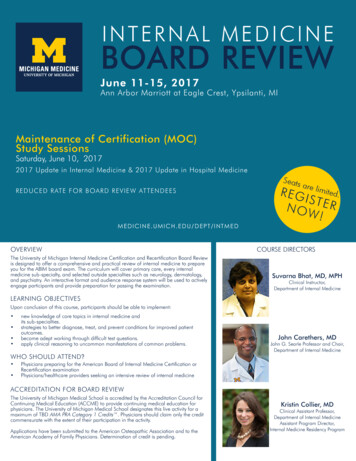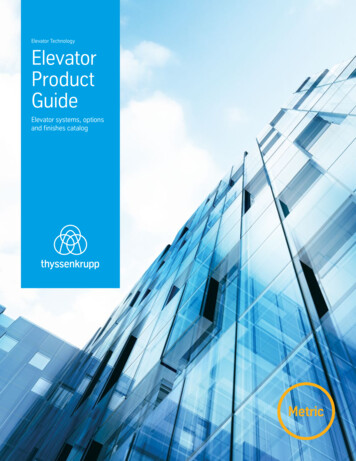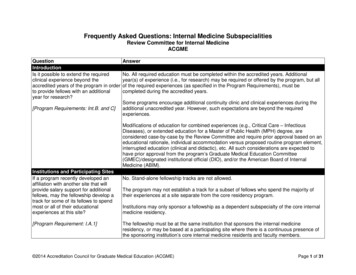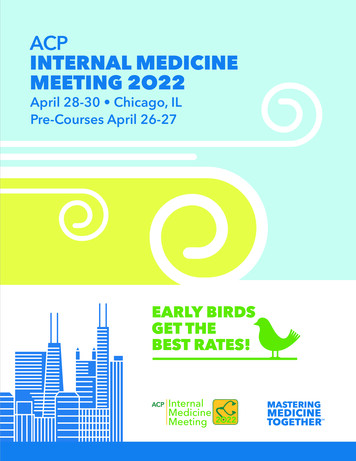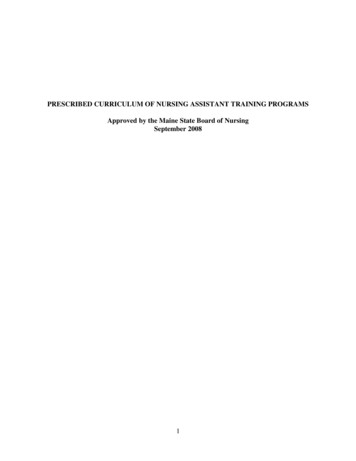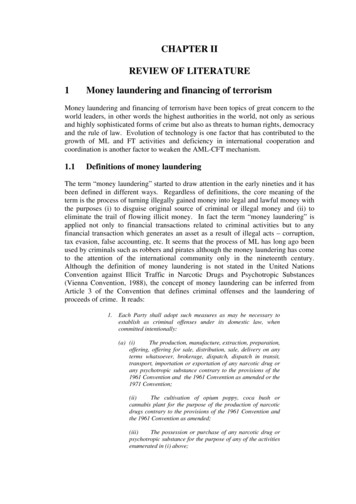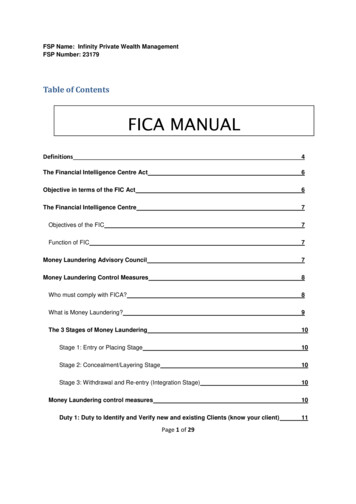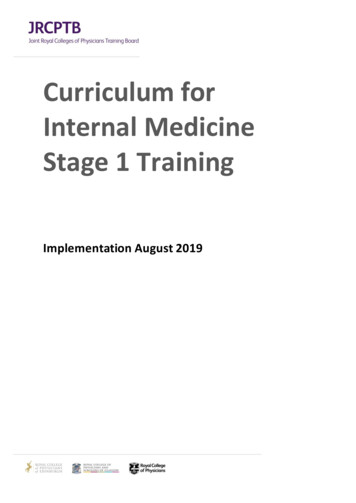
Transcription
Curriculum forInternal MedicineStage 1 TrainingImplementation August 2019
Contents1.Introduction32.Purpose2.1Purpose statement2.2Rationale2.3Development2.4Training Pathway2.5Duration of training2.6Flexibility2.7Less than Full Time Training2.8Generic Professional Capabilities and Good Medical Practice334779910113Content of Learning3.1Capabilities in practice (CiPs)3.2Presentations and conditions3.3Practical procedures121223294Learning and Teaching4.1The training programme4.2Teaching and learning methods4.3Academic training313134375Programme of Assessment5.1Purpose of assessment5.2Programme of Assessment5.3Assessment of CiPs5.4Critical progression points5.5Outline grid of levels expected for CiPs5.6Evidence of progress5.7Decisions on progress (ARCP)5.8Assessment blueprints3838383940424345466Supervision and feedback6.1Supervision6.2Appraisal4849507Quality Management518Intended use of curriculum by trainers and trainees529Equality and diversity53
1. IntroductionInternal Medicine stage 1 will form the first stage of specialty training for most doctorstraining in physician specialties, i.e. those specialties managed by the Joint Royal College ofPhysicians Training Board (JRCPTB). Internal Medicine stage 1 may also form the coretraining programme for other specialties, such as Clinical Oncology. This document onlyincludes the learning outcomes for Internal Medicine Stage 1 and not the furtherrequirements for acquiring a certificate of completion of training (CCT) in a physicianspecialty.This curriculum defines the purpose, content of learning, process of training and theprogramme of assessment for the Internal Medicine Stage 1 training.2. Purpose2.1 Purpose statementThe purpose of the Internal Medicine (IM) stage 1 curriculum is to produce doctors with thegeneric professional and specialty specific capabilities needed to manage patientspresenting with a wide range of general medical symptoms and conditions. They will beentrusted to undertake the role of the medical registrar in NHS district general and teachinghospitals and qualified to apply for higher specialist training.Internal medicine stage 1 will normally be a three year programme that will includemandatory training in geriatric medicine, intensive care, outpatients and ambulatory care.The scope of internal medicine requires diagnostic reasoning and the ability to manageuncertainty, deal with comorbidities and recognise when specialty opinion or care isrequired. There will be a critical progression point at the end of the second year (IM2) toensure trainees have the required capabilities and are entrusted to ‘step up’ to the medicalregistrar role in IM3. For most, the trainee will be entrusted to manage the acute unselectedtake and manage the deteriorating patient with indirect supervision in IM3. For a few thiswill be for a period of time in a supportive training environment with the supervisingphysician readily available (please see section 5.3 for the description of supervision levels).There will be a further critical progression point at completion of IM stage 1 and traineeswill be required to meet all curriculum requirements, including passing the full MRCP(UK)diploma examination by time of completion.Trainees may apply to enter higher specialty training in physician and non-physicianspecialties which do not require completion of IM3. Trainees will need to ensure they meetthe entry requirements for the specialty and the MRCP(UK) full diploma will need to becompleted by the published deadline.Page 3 of 54Internal Medicine Stage 1 – Implementation August 2019
Doctors in training will learn in a variety of settings using a range of methods, includingworkplace-based experiential learning, formal postgraduate teaching and simulation basededucation.IM stage 1 will be the first stage of training in internal medicine and the specialties managedby the Joint Royal College of Physicians Training Board (JRCPTB). Further training in internalmedicine and a specialty will be required to achieve a CCT in internal medicine and specialtytraining. A small number of physician specialties, who will not be expected to provide acuteunselected care as consultants, will recruit trainees who have completed IM1 and IM2. Thecapabilities of trainees at this critical progression point are detailed in the IM stage 1curriculum and will be defined in the relevant specialties’ entry requirements.CMT is currently the approved core training programme for medical microbiology andmedical virology, further to the development of combined infection training. JRCPTB willcontinue to work closely with the Royal College of Pathologists to model the future trainingprogramme for all of the infection specialties as well as other specialties with cross collegetraining (including immunology, haematology and chemical pathology).CMT is also the approved core training programme for clinical oncology and occupationalmedicine. It has been agreed through discussion with the Royal College of Radiologists andthe Faculty of Occupational Medicine that these specialties will select trainees at the end ofIM2. The entry criteria and person specification will be updated accordingly followingimplementation of IM stage 1.The IM capabilities in practice (CiPs) will be shared across all physician curricula, supportingflexibility for trainees to move between the specialties. The generic capabilities andmapping of the curriculum to the GMC’s Generic Professional Capabilities (GPC) framework 1will facilitate transferability of learning outcomes across other related specialties anddisciplines.2.2 RationaleThe Shape of Training (SoT) review2 was a catalyst for reform of postgraduate training of alldoctors to ensure it is more patient focused, more general (especially in the early years) andwith more flexibility of career structure. For physician training, the views andrecommendations of SoT were similar to those of the Future Hospital Commission 3 and theFrancis report4. With an ageing population, elderly patients exhibit co-morbidities andincreasing complexity so acute medical services need a different approach to training thephysician of the future.A further driver for change was the GMC’s review of the curricula and assessmentstandards 5 and introduction of the GPC framework. From May 2017, all postgraduate1Generic professional capabilities frameworkShape of Training: Securing the future of excellent patient care3Future hospital: Caring for medical patients4Report of the Mid Staffordshire NHS Foundation Trust Public Inquiry5Standards and guidance for postgraduate curricula2Page 4 of 54Internal Medicine Stage 1 – Implementation August 2019
curricula should be based on higher level learning outcomes and must incorporate thegeneric professional capabilities. A fundamental component of the GPCs is ensuring that thepatient is at the centre of any consultation and decision making. To this end, communicationskills are emphasised throughout all of our capabilities in practice (CiPs – see below) andevidenced through all our work based assessments (and especially in our use of multi-sourcefeedback – MSF). Trainees are encouraged to reflect on their communication skillsthroughout every stage of their training.JRCPTB, on behalf of the Federation of Royal Colleges of Physicians, has produced a modelfor physician training that consists of an indicative seven year (dual) training period leadingto a CCT in a specialty and internal medicine. Stage 1 training in internal medicine willcomprise the first three years post-foundation training, during which there will be increasingresponsibility for the acute medical take and the MRCP(UK) Diploma will be achieved. Afterthese three years, there will be competitive entry into specialty plus internal medicine dualtraining. A minimum of three years will be spent training in the specialty (there will bevariation across specialties) and there will be a further one year of internal medicineintegrated flexibly within the programme. This will ensure that CCT holders are competentto practice independently at consultant level in both their specialty and internal medicine.This model will enhance the training in internal medicine for all physicians. In particular, itwill promote the management of the acutely unwell patient with an increased focus onchronic disease management, comorbidity and complexity in the main specialtiessupporting acute hospital care. This should be in conjunction with appropriate work forcetransformation to facilitate increased working and collaboration with non-medicalhealthcare professionals and between hospitals and community environments.The curriculum for internal medicine incorporates and emphasises the importance of thegeneric professional capabilities. Common capabilities will promote flexibility inpostgraduate training in line with the recommendations set out in the GMC’s report to thefour UK governments 6. We believe a flexible approach is essential to deliver a sustainablemodel for physician training agile enough to respond to evolving patient need.In summary, the model for physician training and the IM curriculum will: Ensure trainee physicians can provide safe emergency and acute care during and oncompletion of their postgraduate training (as appropriate to their specialty) Ensure that internal medicine doctors develop and demonstrate a range of essentialcapabilities for managing patients with both acute and long-term conditions Ensure that trainee physicians can acquire and demonstrate all of the GMC mandatedGPCs including communication skills Allow flexibility between specialties through GPCs and higher level learning outcomes Further develop the attributes of professionalism, particularly recognition of theprimacy of patient welfare that is required for safe and effective care of those with bothacute and long-term conditions, and develop physicians who ensure patients’ views arecentral to all decision making6Adapting for the future: a plan for improving the flexibility of UK postgraduate medical trainingPage 5 of 54Internal Medicine Stage 1 – Implementation August 2019
Provide the opportunity to develop leadership, team working and supervisory skills inorder to deliver care in the setting of a contemporary multidisciplinary team and to worktowards making independent clinical decisions with appropriate supportProvide doctors with a variety of hospital, community and academic workplaceexperience during their programme. All doctors will have the opportunity to build oncommunity experience gained in foundation training and understand the interface withcommunity care provisionBuild on the knowledge, skills and attitudes that were acquired during undergraduateand foundation trainingEnsure the flexibility to allow trainees to train in academic medicine alongside theiracquisition of clinical and generic capabilities.The curriculum for internal medicine has been developed with the support and input oftrainees, consultants actively involved in delivering teaching and training across the UK,service representatives and lay persons. This has been through the work of the InternalMedicine Committee and its subgroups and at regular stakeholder engagement events. A'proof of concept' study7 was conducted in 2016 and a wide consultation exercise wascarried out in 2017, which have led to significant changes and improvements to the draftcurriculum.High level curriculum outcomes: Capabilities in practiceThe 14 capabilities in practice (CiPs) describe the professional tasks or work within the scopeof internal medicine. Each CiP has a set of descriptors associated with that activity or task.Descriptors are intended to help trainees and trainers recognise the minimum level ofknowledge, skills and attitudes which should be demonstrated for an entrustment decisionto be made. By the completion of training and award of CCT, the doctor must demonstratethat they are capable of unsupervised practice in all generic and specialty CiPs.The six generic CiPs cover the universal requirements of all specialties as described in GPCframework. Assessment of the generic CiPs will be underpinned by the GPC descriptors.Satisfactory sign off will indicate that there are no concerns before the trainee can progressto the next part of the assessment of clinical capabilities.The eight specialty CiPs describe the clinical tasks or activities which are essential to thepractice of internal medicine. The clinical CiPs have also been mapped to the GPC domainsand subsections to reflect the professional generic capabilities required to undertake theclinical tasks. Satisfactory sign off requires demonstration that, for each of the CiPs, thedoctor in training's performance meets or exceeds the minimum expected level ofperformance expected for completion of this stage of internal medicine training, as definedin the curriculum (see 5.5 outline grid of levels expected for each CiP in each year oftraining).7Proof of concept study 2016Page 6 of 54Internal Medicine Stage 1 – Implementation August 2019
Learning outcomes – capabilities in practice (CiPs)Generic CiPs1. Able to successfully function within NHS organisational and management systems2. Able to deal with ethical and legal issues related to clinical practice3. Communicates effectively and is able to share decision making, while maintainingappropriate situational awareness, professional behaviour and professional judgement4. Is focussed on patient safety and delivers effective quality improvement in patient care5. Carrying out research and managing data appropriately6. Acting as a clinical teacher and clinical supervisorSpecialty CiPs1. Managing an acute unselected take2. Managing an acute specialty-related take3. Providing continuity of care to medical in-patients, including management ofcomorbidities and cognitive impairment4. Managing patients in an outpatient clinic, ambulatory or community setting, includingmanagement of long term conditions5. Managing medical problems in patients in other specialties and special cases6. Managing a multi-disciplinary team including effective discharge planning7. Delivering effective resuscitation and managing the acutely deteriorating patient8. Managing end of life and applying palliative care skills2.3 DevelopmentThis curriculum was developed by the Internal Medicine Committee (IMC) and its subgroupsunder the direction of the Joint Royal Colleges of Physicians Training Board (JRCPTB). Themembers of the IMC have broad UK representation and include consultants who are activelyinvolved in teaching and training, trainees, service representatives and lay persons.To facilitate consultation and input from the 30 specialties and three sub-specialties that weoversee, JRCPTB held meetings with all the chairs of the specialty advisory committees(SACs). In addition the model has been shared widely with numerous organisationsincluding: councils of the three physician royal colleges and regional advisors, the traineescommittees of the three colleges, the medical specialties board based in London, heads ofschool of medicine and the postgraduate deans. JRCPTB has held a series of consultationevents with these stakeholders. In addition, podcasts have been available on YouTube andthe JRCPTB website.2.4 Training PathwayInternal medicine (IM) stage 1 training is entered following completion of the foundationprogramme and its purpose is to ensure doctors demonstrate the ability to learn in thePage 7 of 54Internal Medicine Stage 1 – Implementation August 2019
workplace and develop their clinical and professional skills in readiness for higher specialtytraining. Internal Medicine stage 1 forms the initial training programme for the physicianspecialties and doctors in training must complete further Internal Medicine trainingalongside specialty training following selection to ST4 (see training pathway for group 1specialties below).During specialty training, an indicative three years will be spent training for the specialtyand a further year of internal medicine will be integrated flexibly within the specialtytraining programme (some programmes will choose to run this as a separate year whilstothers will integrate it within the specialty training). Internal medicine training will includesupporting the acute specialty take and the acute unselected take.A small number of specialties managed by JRCPTB will continue to deliver non-acute,primarily outpatient-based services (group 2 specialties). They may wish to allowrecruitment into ST3 posts from IM2. However, they may also recruit from those who havecompleted the full three year IM programme and there will be no preferential selection intothese specialties for those who have completed either two or three years of training (seetraining pathway for group 2 specialties).Alternative core training pathways may be accepted for some physician specialties and willbe defined in the relevant curricula.The physician training pathway – group 1 specialtiesPage 8 of 54Internal Medicine Stage 1 – Implementation August 2019
The physician training pathway – group 2 specialties2.5 Duration of trainingInternal Medicine Stage 1 training will usually be completed in three years of full timetraining. Duration of specialty training and completion of further Internal Medicine trainingto CCT will vary by specialty. There will be options for those trainees who demonstrateexceptionally rapid development and acquisition of capabilities to complete training morerapidly than the current indicative time although it is recognised that clinical experience is afundamental aspect of development as a good physician (guidance on completing training inless than 36 months will be available on the JRCPTB website). It is therefore unlikely thatStage 1 IM could be completed in less than 30 months in line with the principles ofcompetency based education. There may also be a small number of trainees who developmore slowly and will require an extension of training in line the Reference Guide forPostgraduate Specialty Training in the UK (The Gold Guide)8.2.6 FlexibilityGPCs will promote flexibility in postgraduate training as these common capabilities can betransferred from specialty to specialty. In addition, the IM CiPs will be shared across allphysician curricula, supporting flexibility for trainees to move between these specialtieswithout needing to repeat aspects of training.Accreditation of transferrable competenciesWhen moving from one approved training programme to another, a trainee doctor who hasgained relevant competences should not have to repeat training already achieved. The8A Reference Guide for Postgraduate Specialty Training in the UKPage 9 of 54Internal Medicine Stage 1 – Implementation August 2019
Academy of Medical Royal Colleges (AoMRC) Accreditation of Transferable CompetencesFramework (ATCF) assists trainees in transferring competences achieved in one trainingprogramme, where appropriate and valid, to another. This could save time for traineedoctors who decide to change career path after completing a part of one trainingprogramme by allowing them to transfer to the most appropriate place in another trainingprogramme.The ATCF applies only to those moving between periods of GMC approved training and isaimed at the early years of training. The time to be recognised within the ATCF is subject toreview at the first Annual Review of Competence Progression (ARCP) in the new trainingprogramme.The Internal Medicine stage 1 programme accepts transferable competences from AcuteCare Common Stem (ACCS) Anaesthesia [Anaes] and ACCS Emergency Medicine [EM]. ATCFwill only be available to doctors who have successfully completed at least one year of anACCS [Anaes, EM] programme and have obtained ARCP outcome 1. The maximum amountof time that can be credited for competences obtained during ACCS [Anaes, EM] is 12months towards training in IM Stage 1.ATCF also applies for trainees who complete ST1-3 of the Emergency Medicine run-throughprogramme.Approval for the previous experience must be agreed by the relevant Internal Medicinestage 1 training programme director on an individual trainee basis, and must be reviewedand confirmed at the first ARCP.Details of the maximum duration and a mapping of transferrable competences are set out inthe table below [NB ACCS Acute Medicine is an approved core programme for all phys icianspecialties so trainees undertaking this pathway can apply at ST3 and ATC does not apply].1st CCTProgrammeACCS [Anaes][EM]Transferring toIM Stage 1CompletedcomponentEM, GIM, ICMST1-3 EMIM Stage 1EM, GIM, ICMExpected countedtime6 months GIM3 months EM3 months ICM6 months GIM3 months EM3 months ICMMaximumcounted time12 months12 months2.7 Less than Full Time TrainingTrainees are entitled to opt for less than full time training programmes. Less than full timetrainees should undertake a pro rata share of the out-of-hours duties (including on-call andother out-of-hours commitments) required of their full-time colleagues in the sameprogramme and at the equivalent stage.Page 10 of 54Internal Medicine Stage 1 – Implementation August 2019
Less than full time trainees should assume that their clinical training will be of a durationpro-rata with the time indicated/recommended, but this should be reviewed in accordancewith the Gold Guide.2.8 Generic Professional Capabilities and Good Medical PracticeThe GMC has developed the Generic professional capabilities (GPC) framework9 with theAcademy of Medical Royal Colleges (AoMRC) to describe the fundamental, career-long,generic capabilities required of every doctor. The framework describes the requirement todevelop and maintain key professional values and behaviours, knowledge, and skills, using acommon language. GPCs also represent a system-wide, regulatory response to the mostcommon contemporary concerns about patient safety and fitness to practise within themedical profession. The framework will be relevant at all stages of medical education,training and practice.The nine domains of Generic Professional CapabilitiesGood medical practice (GMP)10 is embedded at the heart of the GPC framework. Indescribing the principles, duties and responsibilities of doctors the GPC frameworkarticulates GMP as a series of achievable educational outcomes to enable curriculum designand assessment.The GPC framework describes nine domains with associated descriptor outlining the‘minimum common regulatory requirement’ of performance and professional behaviour forthose completing a CCT or its equivalent. These attributes are common, minimum andgeneric standards expected of all medical practitioners achieving a CCT or its equivalent.9Generic professional capabilities frameworkGood Medical Practice10Page 11 of 54Internal Medicine Stage 1 – Implementation August 2019
The 20 domains and subsections of the GPC framework are directly identifiable in the IMcurriculum. They are mapped to each of the generic and specialty CiPs, which are in turnmapped to the assessment blueprints. This is to emphasise those core professionalcapabilities that are essential to safe clinical practice and that they must be demonstrated atevery stage of training as part of the holistic development of responsible professionals.This approach will allow early detection of issues most likely to be associated with fitness topractise and to minimise the possibility that any deficit is identified during the final phasesof training.3 Content of LearningThe practice of Internal Medicine requires the generic and specialty knowledge, skills,attitudes and procedural skills to manage patients presenting with a wide range of medicalsymptoms and conditions. It involves particular emphasis on diagnostic reasoning, managinguncertainty, dealing with comorbidities, and recognising when specialty opinion or care isrequired.3.1 Capabilities in practiceCapabilities in practice (CiPs) describe the professional tasks or work within the scope ofinternal medicine. CiPs are based on the format of entrustable professional activities 11which are a method of using the professional judgement of appropriately trained, expertassessors as a key aspect of the validity of assessment and a defensible way of formingglobal judgements of professional performance.Each CiP has a set of descriptors associated with that activity or task. Descriptors areintended to help trainees and trainers recognise the minimum level of knowledge, skills andattitudes which should be demonstrated by stage 1 internal medicine doctors. Doctors intraining may use these capabilities to provide evidence of how their performance meets orexceeds the minimum expected level of performance for their year of training. Thedescriptors are not a comprehensive list and there are many more examples that wouldprovide equally valid evidence of performance.Many of the CiP descriptors refer to patient centred care and shared decision making. This isto emphasise the importance of patients being at the centre of decisions about their owntreatment and care, by exploring care or treatment options and their risks and benefits anddiscussing choices available.Additionally, the clinical CiPs repeatedly refer to the need to demonstrate professionalbehaviour with regard to patients, carers, colleagues and others . Good doctors work inpartnership with patients and respect their rights to privacy and dignity. They treat eachpatient as an individual. They do their best to make sure all patients receive good care andtreatment that will support them to live as well as possible, whatever their illness or11Nuts and bolts of entrustable professional activitiesPage 12 of 54Internal Medicine Stage 1 – Implementation August 2019
disability. Appropriate professional behaviour should reflect the principles of GMP and GPC(see section 2.6).In order to complete training and be recommended to the GMC for the award of CCT andentry to the specialist register, the doctor must demonstrate that they are capable ofunsupervised practice in all generic and specialty CiPs.Satisfactory sign off at the end of Internal Medicine stage 1 requires demonstration that, foreach of the CiPs, the doctor in training's performance meets or exceeds the minimumexpected level of performance expected for completion of this stage of internal medicinetraining.This section of the curriculum details the 14 generic and specialty CiPs for Internal MedicineStage 1 with expected levels of performance, mapping to relevant GPCs and the evidencethat may be used to make an entrustment decision.3.1.1 Generic capabilities in practiceThe six generic CiPs cover the universal requirements of all specialties as described in GMPand the GPC framework. Assessment of the generic CiPs will be underpinned by thedescriptors for the nine GPC domains and evidenced against the performance andbehaviour expected at that stage of training. Satisfactory sign off will indicate that there areno concerns before the trainee can progress to the next part of the assessment of clinicalcapabilities. It will not be necessary to assign a level of supervision for these non-clinicalCiPs.In order to ensure consistency and transferability, the generic CiPs have been groupedunder the GMP-aligned categories used in the Foundation Programme curriculum plus anadditional category for wider professional practice: Professional behaviour and trustCommunication, team-working and leadershipSafety and qualityWider professional practiceFor each generic CiP a set of descriptors of the observable skills and behaviours which woulddemonstrate that a trainee has met the minimum level expected. The descriptors are not acomprehensive list and there may be more examples that would provide equally validevidence of performance.Generic capabilities in practice (CiPs)Category 1: Professional behaviour and trust1. Able to function successfully within NHS organisational and management systemsDescriptors Aware of and adheres to the GMC professional requirements Aware of public health issues including population health, social detriments ofPage 13 of 54Internal Medicine Stage 1 – Implementation August 2019
GPCsEvidence toinform decisionhealth and global health perspectives Demonstrates effective clinical leadership Demonstrates promotion of an open and transparent culture Keeps practice up to date through learning and teaching Demonstrates engagement in career planning Demonstrates capabilities in dealing with complexity and uncertainty Aware of the role of and processes for commissioningDomain 1: Professional values and behavioursDomain 3: Professional knowledge professional requirements national legislative requirements the health service and healthcare systems in the four countriesDomain 9: Capabilities in research and scholarshipMCRMSFActive role in governance structuresManagement courseEnd of placement reports2. Able to deal with ethical and legal issues related to clinical practiceDescriptorsGPCsEvidence toinform decision Aware of national legislation and legal responsibilities, including safeguardingvulnerable groups Behaves in accordance with ethical and legal requirements Demonstrates ability to offer apology or explanation when appropriate Demonstrates ability to lead the clinical team in ensuring that medical legalfactors are considered openly and consistentlyDomain 3: Professional knowledge professional requirements national legislative requirements the health service and healthcare systems in the four countriesDomain 4: Capabilities in health promotion and illness preventionDomain 7: Capabilities in safeguarding vulnerable groupsDomain 8: Capabilities in education and trainingDomain 9: Capabilities in research and scholarshipMCRMSFCbDDOPSMini-CEXMRCP(UK)ALS certificateEnd of life care and capacity assessmentEnd of placement reportsCategory 2: Communication, teamworking and leadership3. Communicates effectively and is able to share decision making, while maintainingapp
Internal Medicine Stage 1 – Implementation August 2019 1. Introduction Internal Medicine stage 1 will form the first stage of specialty training for most doctors training in physician specialties, i.e. those specialties managed by the Joint Royal College of Physicians Training Board (JRCPTB).
